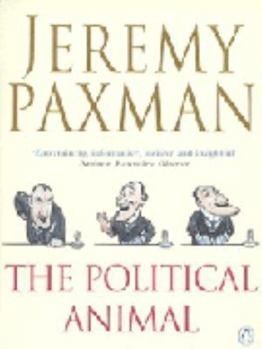Political Animal: An Anatomy
Select Format
Select Condition 
Book Overview
Jeremy Paxman knows every maneouvre a politician will make to avoid answering a difficult question, but in "The Political Animal" he seeks an answer to just one: What makes politicians tick? Embarking... This description may be from another edition of this product.
Format:Paperback
Language:English
ISBN:0140288473
ISBN13:9780140288476
Release Date:October 2007
Publisher:Penguin UK
Length:352 Pages
Weight:0.55 lbs.
Dimensions:7.7" x 0.9" x 5.4"
Customer Reviews
2 ratings
Witty, biting and strangely affectionate
Published by Thriftbooks.com User , 17 years ago
A delightful, sharp book full of wisdom and cynicism on British political life. Paxman gives proper criticism but healthy doses of understanding and respect to MPs both past and present, PMs to backbenchers. Upon first coming upon a Conservative MP at a speech as a school boy to seeing Tony Blair roll to a 2nd landslide, Paxo's musings are prescient and interesting. Unlike most British political commentary, he really delves into the minutia of life between Yea and Nea lobbies of the Commons and the vague absurdities, idignities and also triumphs of dealing with and campaigning in one's constituency. Through no fault of his own, a defiency in the book is that its outlook predates the Iraq invasion when Blair's popularity really began to drop and his moral authority dramatically suffered. The vantage point is not as dark and the-sky-is-falling as public outlook is on foreign policy, at this writing, at the close of the Blair Years. But perhaps Paxo would not be so influenced by such public perceptions. He draws great rememberances of politicians of a rhetorical past we've not seen, hardly remembered and rarely appreciated. Also, Paxman successfully resists political platitudes and a book that begins with questions pleasantly ends with probably more of them, not less. For those looking for some kind of literary version of his hard-hitting interviewing on Newsnight, they will be disappointed. Though I love that style, here is something far more illuminating and far more edifying.
GRAND INQUISITOR
Published by Thriftbooks.com User , 20 years ago
There are very few slouches, if any, among the political interviewers that I have seen in Britain and the USA. Paxman is not perfect by any means, but I have never quite seen his equal. He has two besetting sins. One is in overdoing questions of the `Why are you beating your wife?' variety and the other is a propensity to naff debating points, trying to manoeuvre ministers who admit to the slightest change of mind into saying that they should be considering resignation on that account. He is quick-witted, forceful and tenacious, and he is guiltless of the mindset known in America as `respect', something that can disconcert his American interviewees who consider respect to be their right.The tone he adopts in this book does not surprise me, but it may have surprised some of his victims. It is analytic, the wit and perception is often acerbic, but in general it is far from unsympathetic to politicians. Paxman muses on what the job is, what it is perceived to be both by those who do it and by the general public, and what persuades people to go in for it. He sees the whole political circus as a combination of the inspiring and the demeaning, its actors a combination of the powerful and the completely futile, helpless, naïve and manipulated. He does not spare individuals, and even American readers ought to be entertained by the part about the ludicrous Sir Gerald Nabarro, whom older British citizens will wince to recall and who would have been thought highly improbable if he had been a character in fiction. He has no strong political convictions of his own so far as I can see, and he is candid about any he ever did have. Like myself, he joined the Labour society at university not through any great belief in Labour but because he could not even stomach the alternative. He feels some obvious nostalgia for the days when there was a clear philosophical divide and not just a choice of managements, as when Clement Attlee's post-war government aspired to `the socialist commonwealth of Britain', but he is not so simple-minded as to suppose that any such clear ideological choice is possible without disastrous results these days. How much, or rather how little, really depends on ideology as opposed to perceptions, outside influences, individual decisions and particularly individual mistakes, sheer luck and above all what Macmillan called `events, dear boy, events' is something on which I find him particularly clear-headed and illuminating. He writes in much the way he talks. That suits me in general, except to say that he is prone to giving too many instances. On air these come over very effectively as pungent asides, in print they tend to dilute the thrust of his argument which is somewhat discursive anyway. This is good-quality journalese, the work of a thoughtful, intelligent and battle-experienced professional, and I found it a very easy and agreeable read. As a writer he is no Muggeridge, but as a thinker he is less egocentric and much fairer-minded. He is






